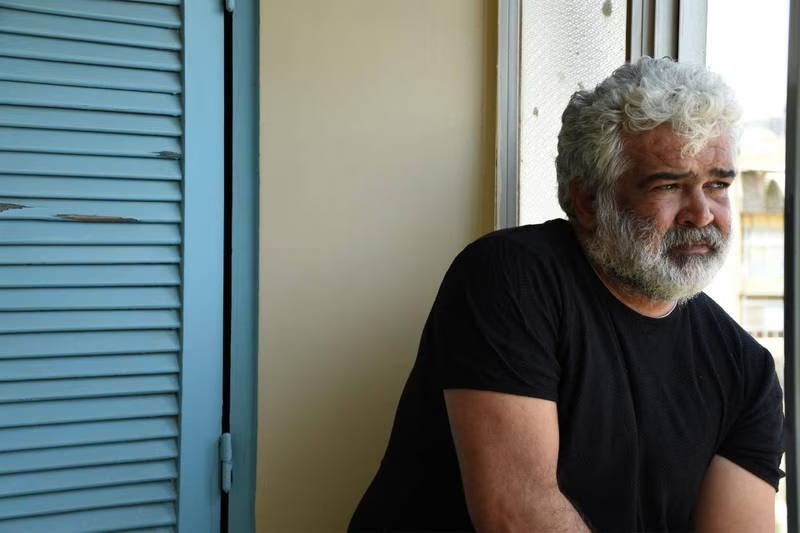The Syrian Novel Making Me Rethink Everything
(or at least the way I write scenes)
I’ve been horribly late in reporting on the eighth book in my journey of reading my way around the world in translation. It’s partly because I’ve been on tour with a fried brain, and partly because it’s taken me a while to wrap that (fried) brain around a really unusual and complicated book.
This is the first of a handful of Arabic-original books that I asked the brilliant author Rabih Alameddine to recommend to me; I trust his literary taste completely, and was not let down by No Knives in the Kitchens of this City, the Syrian author Khaled Khalifa’s 2013 sprawling novel about the history of one Aleppo family.
The English-language version, translated by Leri Price, is from Hoopoe—an imprint dedicated to stories from the Middle East.
A quick synopsis, sort of:
Our narrator, born right before Syria’s 1963 Ba’ath coup, is one of four children of a schoolteacher mother and an absent father. One sister dies young; the other sister, Sawsan, reels between sexual liberation and religious conservatism; his brother, Rashid, is a gifted violinist under the tutelage of his gay uncle, Nazir, whose own travails are one of the novel’s more compelling storylines. We start after the mother’s death, and circle back in time and then forward and basically don’t get much further than her death. It’s a picture of life under an oppressive regime, life in a wildly changing city, life in a volatile family.
Perhaps a better way to describe it: If you asked someone to tell you everything about his family, and he went into every family member and every story, went off an every tangent including the childhood of a neighbor’s first husband (and if, for some reason, this person had access to things he wasn’t there for and would probably never have been told about, including the details of other people’s sex lives), it might sound something like this book. Episodic, nonlinear, circling back at random, building a broad and impressionistic picture.
But here’s the rub:
About a quarter of the way into the book, I had to start over, because… absolutely everything here is summary. It might be summary of a decade of backstory, or summary of a few days, or summary of a scene (essentially, he told her x, and she explained that y, and they spent time talking about z, rather than “Blah blah bah,” she said, scratching her left ear), but we’re never in a beat-by-beat scene. And as an American, I’m primed to read summary as background, the stuff we need to know before the real story starts. I kept waiting for a scene to start, so I’d know what to pay attention to. And when, a quarter of the way into the book, the scene still hadn’t started, I realized that everything I’d been skimming over was the whole point. I had to go back and pay attention to what I’d assumed was background noise. Once I was tuned into the right frequency, the book worked brilliantly.
I’ve been noticing more of this lean on synopsis, often non-chronological, in some of the other translated books I’ve read, notably Magda Szabó’s The Door, and wondering if my reliance on scene isn’t perhaps a particularly American/English-language tendency.
Which makes me think…
I tend to look at scenes as the bricks of the house, and exposition/summary as the mortar. There are writers like Alice Munro who use a lot of mortar brilliantly, and there are ones who essentially use only bricks—sometimes effectively, sometimes not. (A tragedy of young writers absorbing so much narrative from screens and taking “show don’t tell” too seriously is a slew of writers thinking they can only write in scene, as if dictating a screenplay.)
But I’m questioning my own balance of scene and exposition and summary, and where my instincts for that balance come from. Basically: Something that I thought was pretty endemic to storytelling in general turns out to be much more learned and cultural than I’d thought.
Wait, here’s stuff about the author:
Khalifa still lives in Syria despite the fact that his books have been banned there; the original Arabic edition of the novel was published in Cairo. In a 2019 interview, he said, “What could I do for my people, living in Europe? Maybe because I live in Syria and I live inside Syria and am with my people, I am strong and have hope.”
He’s primarily a screenwriter (fascinating, given what I just said above about scenes!), but has published several novels, the latest of which, No One Prayed Over Their Graves, will be released in English this summer.
So what’s next?
Minor Detail, by the Palestinian author Adania Shibli. This one is VERY short, which means I’ll post about it soon, and you should join me in reading!
This will bring our map up to date like so…
Please come along!









I have to say, I feel very attached to the summary as set-up, followed by scene, but this is food for thought about checking one's baggage of expectations when cracking open a new book.
What an experience it was to read this novel. And this is a wonderful post. I love summary (reading it and writing it) and feel so uncomfortable, even artificial, when I "have to" write a scene. This whole project is giving me permission to buck certain craft truisms.